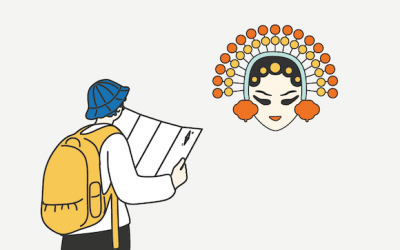The Most Useful Structures For Past Tense in Chinese
Tenses in Chinese often give Chinese learners headaches. We talked about the future tense in one of our previous blog articles. Obviously, the past tense is another essential aspect during Chinese learning. Today let’s take a look at five structures that are related to the past tense.

1. Verb + 了 (le)
This is the most basic structure used to indicate the past tense. It usually refers to a certain event that took place in the past, which means it’s similar to the “simple past tense” in English.
EXAMPLE:
Jason 昨天去了北京。
Jason zuótiān qù le Běijīng.
Jason went to Beijing yesterday.
2. Verb + 过 (guò)
When it comes to tenses in Chinese, many Chinese learners feel puzzled about the difference between “verb + 了 (le)” and “verb + 过 (guò)” as they are both related to the past tense. The main difference between these two structures lies in the fact that “verb + 了 (le)” puts an emphasis on “facts”, whereas “verb + 过 (guò)” lays stress on “past experience”. Let’s take a look at the following examples to help you better understand the use of these two structures:
EXAMPLE 1:
我昨天去了北京。
Wǒ zuótiān qù le Běijīng.
I went to Beijing yesterday.
我去过北京。
Wǒ qù guò Běijīng.
I’ve been to Beijing before.
EXAMPLE 2:
星期三我吃了中国菜。
Xīngqīsān wǒ chī le Zhōngguó cài.
I had Chinese food on Wednesday.
我吃过中国菜。
Wǒ chī guò Zhōngguó cài.
I’ve tried/eaten Chinese food before.
3. 已经 (yǐjīng) + Verb + 过 (guò) + Object + 了 (le)
“已经 (yǐjīng)” is an important word in terms of the past tense, and it means “already”. This structure is often used when Chinese people would like to emphasize that a certain action has been completed.
EXAMPLE:
我们已经吃过晚饭了。
Wǒmen yǐjīng chī guò wǎnfàn le.
We’ve already had dinner.
他已经看过这个电影了。
Tā yǐjīng kàn guò zhè gè diànyǐng le.
He has already watched this movie.
4. 没 (méi) + Verb
As you might have noticed, all the examples given above are positive statements. When it comes to negative statements with the use of the past tense, the most important structure you need to remember is “没 (méi) + verb”, which means “didn’t do something”. What you need to bear in mind is that “了 (le)” is not needed.
EXAMPLE:
上个星期我没去工作。
Shàng gè xīngqī wǒ méi qù gōngzuò.
I didn’t go to work last week.
5. 没 (méi) + Verb + 过 (guò)
We’ve discussed that the use of “过 (guò)” implies past experience. Therefore, this structure can be translated as “have never done something before”.
EXAMPLE:
Alice 没喝过绿茶。
Alice méi hē guò lǜchá.
Alice has never tried/drunk green tea.
To find out more interesting phrases and questions in Chinese, check out one of our blog posts How to Say “Popular”, “Trending”, “Viral” in Chinese









0 Comments